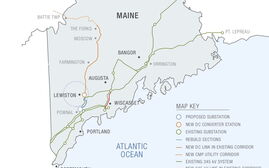CMP’s $950M transmission project achieves one milestone, but other hurdles remain
 Photo / New England Clean Energy Connect
Central Maine Power's proposed $950 million transmission project in western Maine, which received a "certificate of public convenience and necessity” from the Maine Public Utilities Commission on April 11, has hit a speed bump. In a strongly worded letter to the Army Corps of Engineers' New England office, the federal Environmental Protection Agency says CMP's permit application with the Army Corps is "incomplete" and needs a “detailed analysis” of alternatives.
Photo / New England Clean Energy Connect
Central Maine Power's proposed $950 million transmission project in western Maine, which received a "certificate of public convenience and necessity” from the Maine Public Utilities Commission on April 11, has hit a speed bump. In a strongly worded letter to the Army Corps of Engineers' New England office, the federal Environmental Protection Agency says CMP's permit application with the Army Corps is "incomplete" and needs a “detailed analysis” of alternatives.
Central Maine Power received a critical “certificate of public convenience and necessity” from the Maine Public Utilities Commission on Thursday for its $950 million New England Clean Energy Connect transmission project in western Maine.
The unanimous vote by the three-member PUC, all political appointees of former Gov. Paul LePage, represents a critical milestone as the controversial project makes its way through a regulatory approval process that includes pending decisions by the Maine Department of Environmental Protection and the Land Use Planning Commission. Those agencies, which held a joint weeklong public hearing in Farmington last week, will be making decisions that are more focused on the project’s environmental impacts and adherence to land use regulations.
CMP's proposed 145-mile transmission project to deliver 1,200 megawatts of renewable energy generated by Hydro-Quebec to Massachusetts also faces additional regulatory review by the U.S. Army Corps of Engineers. If successful in gaining approvals from all those regulatory parties, the project's final hurdle will be to receive a Presidential Permit, which is required for all electric transmission lines that cross the U.S. international border and involve imports of electricity generated by another country. That authorization is expected by December.
PUC: Project is in the ‘public interest’
“This project has significant benefits for the people of Maine” Commission Chairman Mark Vannoy said in a written statement sent to Mainebiz. “The [CMP] application meets all the statutory requirements and is in the public interest. In addition to important enhancements to Maine’s electric system reliability, 1,200 MW of hydroelectric generation injected into the New England region should help to partially mitigate ongoing fuel security concerns in Maine and the region.”
The other two PUC commissioners added these comments:
- Commissioner Bruce Williamson: “The economic benefits to Maine are very real and substantial, including energy market and capacity market effects. This reduces electricity costs to Maine energy users and has benefits for plans to electrify other sectors of the economy.”
- Commissioner Randall Davis: “As Maine’s appetite for variable generation from solar and wind surges, NECEC’s hydro is the perfect complement with 24-by-7 base-load capability.”
The commissioners’ approval follows the recommendation of the 162-page Examiners' Report written by PUC staff that analyzed thousands of pages of testimony, much of it submitted in opposition to CMP’s proposal. Examiners Mitchell Tannenbaum and Chris Simpson, who were assisted by Faith Huntington, Christine R. Cook and Denis Bergeron considered NECEC’s impact on economics, reliability, public health and safety, scenic, historic and recreational values, and state renewable energy goals and concluded the project met the public interest and public need standards “based on a careful weighing of the benefits and costs of the NECEC to the ratepayers and residents of the State of Maine.”
On Thursday, PUC commissioners also endorsed provisions of the NECEC stipulation agreement filed on Feb. 21 that CMP and Hydro-Quebec reached with the state and stakeholders that included the Maine Public Advocate’s Office, Industrial Energy Consumer Group, Conservation Law Foundation, Acadia Center, Western Mountains & Rivers Corp., City of Lewiston, Maine State Chamber of Commerce, International Brotherhood of Electrical Workers and the Maine Governor’s Energy Office.
Commissioners stated the stipulation’s benefits will be “realized by Maine through funding mechanisms and programs to provide rate relief to Maine ratepayers, benefits for Maine’s low-income customers, and support for a variety of other programs that benefit Maine communities and the environment.”
The PUC’s written statement concluded: “During today’s deliberations, the commissioners acknowledged that the project came with some challenges for Maine. The project may impact scenic and recreational values, as well as tourism in the communities in proximity to the project. However, when these issues are balanced against the ratepayer, economic, and environmental benefits of the NECEC, the commission determined that the adverse effects are outweighed by the significant benefits.”
CMP’s response
Doug Herling, CMP’s president and CEO, sent the following written statement to Mainebiz following the PUC’s vote: “We are thrilled that the Commission has voted in favor of this project. This approval marks a major milestone for the NECEC and for the region’s efforts to secure a future of clean, reliable energy. Today’s decision confirms the New England Clean Energy Connect will deliver environmental, economic, energy security, and other benefits for Maine and for consumers throughout New England.”
“The NECEC is planned to provide 1,200 megawatts of transmission capacity and deliver clean, renewable electricity to the New England Grid from hydro-power resources in Québec. The Commission’s decision comes at the end of an in-depth 18-month analysis weighing the impacts and benefits of the project for Maine consumers.
“Central Maine Power proposed the NECEC in response to a solicitation by Massachusetts utilities in response to that state’s Global Warming Solutions Act, which set goals to increase supplies of electricity from clean, renewable sources for Massachusetts consumers. The Commission’s decision comes at the end of an in-depth analysis by the Commission staff and consultants to weigh the impacts and benefits of the project for Maine consumers. The Commission’s findings directly rebut arguments from parties representing the electricity generation industry that oppose policymakers’ efforts to address climate change and the region’s heavy dependence on costly fossil fuel energy supplies.
“Addressing the twin challenges of climate change and energy affordability will require a sustained, regional commitment to action. The need for progress should always be weighed against the impacts and benefits of every project, and the NECEC is no exception. In this case, we believe the Commission gave due consideration to all perspectives, and as this decision shows, the balance strongly favors our project.”
Reaction from opponents
Sue Ely, a staff attorney at the Natural Resources Council of Maine, called the decision deeply flawed, expressing the environmental group’s belief that the enormous transmission line will do much more harm than good.
“Today the PUC chose CMP’s corporate interests over the interests of Maine and its people,” she said in a written statement sent to Mainebiz. “The PUC’s deeply flawed decision is based on overinflated benefits and ignores the very real harm this enormous transmission line would inflict on Maine.
“It understates the damage this project would cause to Maine’s North Woods, the negative impact it would have on local clean energy projects, and the failure by CMP to demonstrate that the project would provide actual net benefits for our climate. At every juncture, Mainers have voiced their overwhelming opposition to this project, and we are confident that they will continue to do so during the multiple permitting processes that still lie ahead for the project.”
Ely said the PUC decision is but one step in a multi-agency and multi-state permitting and review process that ultimately will determine whether CMP’s $950 million transmission project goes through. The Maine DEP and LUPC decisions aren’t expected until fall of 2019 and the Massachusetts Department of Public Utilities also must sign off on the project.
She also noted that CMP’s corridor project is facing widespread opposition across Maine, citing 11 towns along the proposed corridor, in addition to the Franklin County commissioners, that have now voted to oppose the project or have rescinded support. She also cited a recent statewide poll showed 65% of Mainers oppose the project, with 90% of voters in Franklin County and 83% of voters in Somerset County being opposed to the proposed power line.
Ely said the project also faces increased scrutiny by the Maine Legislature. One bill, LD 640, would require an independent analysis of the project’s climate impact and a trio of bills, LD 1383, LD 271, and LD 1363, would protect local control over for-profit transmission projects like the CMP corridor.
Sandra Howard, director of the NO to NECEC grassroots opposition group, also called the PUC’s action a “flawed decision.”
“The PUC ignored the fact that of the nearly 1,400 comments members of the public filed, fewer than 50 were in support of the project,” she said in a written statement sent to Mainebiz. “The PUC commissioners and staff ignored the fact that towns and counties are stampeding to make their opposition to the corridor clear .... Regulators are supposed to protect the interests of Mainers, but it is clear that did not happen at the PUC. We are encouraged by the bipartisan support growing in Augusta with numerous bill proposals associated to delay, change, and defeat the CMP corridor project."














0 Comments